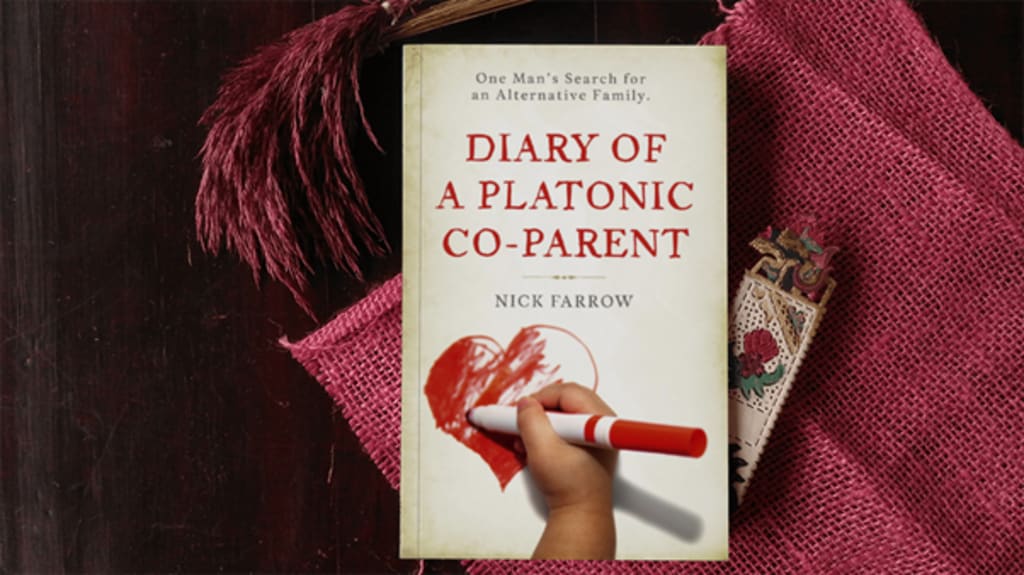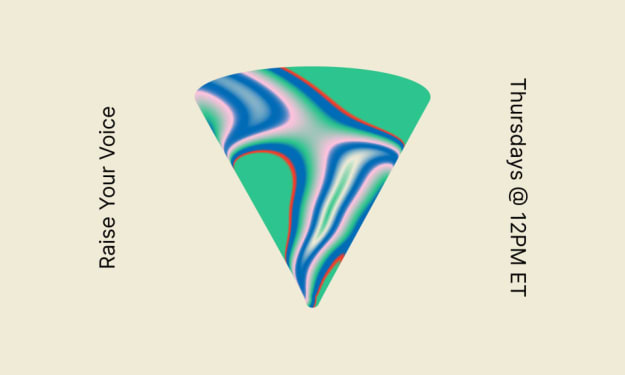Diary of a Platonic Co-Parent
By Nick Farrow

‘If there is such a thing as a good marriage, it is because it resembles friendship rather than love.’ Michel de Montaigne.
My name is Nick and I’m going to tell you a personal story. At 42, after a year planning a family with my partner, I unexpectedly found myself single. I was devastated at the loss of this potential family that I had been so eagerly expected. After my heart healed, I put myself through two years of internet dating, which ultimately came to nothing. There must have been a desperation in my eyes. Few rules in life that are set in stone, but is wanting children the best motivation for seeking a romantic relationship? Would it be giving the relationship the best foundation for success? And what if it didn’t work out? I could end up as a bitter co-parent. God forbid. Forward to the present time. I am now as a 54-year-old man who considers himself extremely fortunate. I have the most beautiful 8-year-old daughter and a wonderful friendship with her mother, with whom I am a platonic co-parent with.
What is Platonic Co-Parenting?
Platonic co-parenting is an arrangement where two or more individuals decide to have a child together with no attached romantic or sexual relationship. In this arrangement, the co-parents share equal parenting responsibilities and make joint decisions about their child’s upbringing. As people’s emotional and relationship needs have changed over the last decade, this unique form of parenting has become increasingly popular among certain sections of society. Like any relationship, however, platonic co-parenting comes with its own set of advantages and disadvantages.
How Did I Learn About Platonic Co-Parenting?
This culture of parenting has been popular in the LGBTQI community for a long time. When I researched how I could go about doing it, I could find no role models in the heterosexual community. Luckily, I got fantastic advice from my gay and lesbian friends. I was directed to the website Modamily.com, which is an online platform designed to connect individuals who are interested in platonic parenting. It was this website where I would eventually meet my future co-parent.
When I first heard about the term, I used to call it ‘Plutonic Co-Parenting.’ I soon came to realise, however, that would mean your co-parent lived on Pluto (I would strongly recommend against this as the travel arrangements alone would be a real headache). I was very fortunate to meet someone who was an excellent match for me fairly quickly. We were quite different personalities, but had very similar principles and visions of the family we were looking for. We spent the next 5 months in weekly meetings, eagerly putting our co-parenting agreement together.
An Argument Against Co-Parenting
The concept of Platonic Co-Parenting seems to press buttons for certain people. Big ones. For some, there can be a difficulty of conceiving of any type of family that lies outside the traditional concept of the nuclear family. They can’t seem to see past the religious and economic ideology that built it. There can also be a struggle to see beyond romantic attachment as the only form of viable or authentic relationship. In my memoir, Diary of a Platonic Memoir I attempt to deconstruct why this might be the case. Let us look at part of the argument here. It’s an interesting one.
The argument goes something like this; The platonic family structure can not provide children with the same stability as a traditional family structure. While co-parents may be committed to their child’s well-being, the lack of a romantic relationship between the parents will create a sense of instability or uncertainty for the child.
Our Collective Addiction to Romantic Love.
The joys of romantic love. That prickly little bundle of joy we can’t seem to get enough of. We spend our lives chasing it. We complain if there’s not enough, suffocate if there’s too much and then get depressed when it fades away. It is the emotional equivalent of crack cocaine. Most of our films, stories, advertising and collective beliefs support the notion that our one true soulmate is waiting for us. Just round the corner. Once you meet them, all your problems will fade away. Let me ask you a question. How many of you have found this to be the case?
Where did the notion of romance stem from?
Right until the 16th century, romantic love, far from being seen as the sole reason for marriage, was considered a risky strategy that could affect the success of a family that has to raise children and pay the bills. The criteria for success was to find a partner that had a good earning potential, came from a good background, with a sound education and reputation.
As we got into the 19th century in the west, literacy improved, romantic literature flourished. People started writing love letters. As the ability to get work became easier, people became less dependent on their inheritances and made their own decisions instead of following what their family dictated. With this autonomy, romantic love became an increasingly important consideration alongside the more practical aspects of who someone should marry. Pretty soon, the importance of romantic love in the West became all-consuming.
Still today however, many other cultures don’t see romantic love as the primary motivation for wedlock. For the Amish community, marriages are usually arranged by matchmakers and parents, with input from the young couple. Love may develop after marriage, but it is not the main reason for getting married.
In India, arranged marriages are still very common. Families will match a bride and groom based on factors like family backgrounds, education, jobs, social status and earning potential. Love and physical attraction are secondary to finding a suitable match that will benefit both families. The couples often only meet briefly before the wedding or occasionally not at all before they wed. However, they are expected to cultivate love and respect over the lifetime of their marriage through commitment and compromise.
In some African countries, marriage is viewed more as a union between two families and communities rather than just two individuals. Bride prices or dowries are still frequently paid in cattle or other goods, as a man’s family pay the woman’s kin for her hand in marriage. Marriages are seen as a way to strengthen tribal and familial alliances as well as a means for a man to show he is financially prepared for marriage by being able to pay a substantial bride price. Whilst the bride and groom’s wishes are considered, the families play an integral role in mate selection and marriage arrangements.
Factors like family obligations, duty, financial security and social expectations remain the primary drivers in mate selection and marriage for many. Though at odds with Western ideals of romantic love, marriages forged on more practical foundations can be equally — if not more — enduring. Cultural relativism suggests there are many valid ways of forming meaningful relationships, even if love looks different across the world.
Romantic attachment is only once aspect of love and, as we have all witnessed, can be temporary. To suggest there can’t be love without romance, I believe, is mistaken. A person who identifies as aromantic experiences little or no romantic attraction in their relationships. Someone who identifies as asexual experiences a lack of sexual attraction towards others. It is possible for a person to possess both theses orientations. Are we to believe that experiencing aromantic or asexual traits limits a person’s ability to love? I am sure both the aromantic and asexual communities would strongly refute this.
How is Platonic Co-Parenting Working For Us?
We are nearly 9 years in and it’s working very well. Through listening, empathy, good communication, and a firm commitment to our daughter, my co-parent and I have established a healthy trust and respect. We are, in essence, good friends who have planned and built a family together. It suits our lives, and it works well for all of us. Like any relationship, it needs watering and attention, but the benefits have been profound.
The reason I wrote my memoir is to show that platonic co-parenting offers an alternative approach to family and parenting for individuals who may not desire or fit into the parameters of a romantic partnership. It is my belief that as society becomes more accepting of non-traditional family structures, platonic co-parenting will become increasingly recognised as a legitimate and viable option for individuals who want to have children.
About the Creator
Nick Farrow
Nick Farrow is a published author from the south coast of England. He is a keen gardener, swimmer and charity worker . He has been part of a platonic co-parenting family for the past 8 years which he has written about in his latest memoir.






Comments
There are no comments for this story
Be the first to respond and start the conversation.